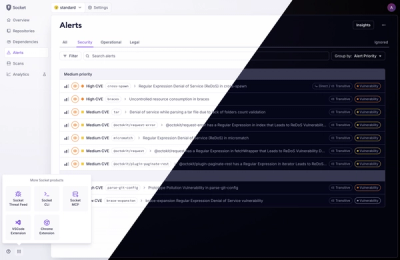
Product
A Fresh Look for the Socket Dashboard
We’ve redesigned the Socket dashboard with simpler navigation, less visual clutter, and a cleaner UI that highlights what really matters.
@promptbook/openai
Advanced tools
Promptbook: Run AI apps in plain human language across multiple models and platforms
Write AI applications using plain human language across multiple models and platforms.
.book files with syntax highlighting and IntelliSensehejny/promptbook) for seamless containerized usageo3-mini, GPT-4 and other leading LLMs@promptbook/openai@promptbook/openai is one part of the promptbook ecosystem.To install this package, run:
# Install entire promptbook ecosystem
npm i ptbk
# Install just this package to save space
npm install @promptbook/openai
@promptbook/openai integrates OpenAI's API with Promptbook. It allows to execute Promptbooks with OpenAI GPT models.
import { createPipelineExecutor } from '@promptbook/core';
import {
createCollectionFromDirectory,
$provideExecutionToolsForNode,
$provideFilesystemForNode,
$provideScrapersForNode,
$provideScriptingForNode,
} from '@promptbook/node';
import { JavascriptExecutionTools } from '@promptbook/javascript';
import { OpenAiExecutionTools } from '@promptbook/openai';
// 🛠 Prepare the tools that will be used to compile and run your books
// Note: Here you can allow or deny some LLM providers, such as not providing DeepSeek for privacy reasons
const fs = $provideFilesystemForNode();
const llm = new OpenAiExecutionTools(
// <- TODO: [🧱] Implement in a functional (not new Class) way
{
isVerbose: true,
apiKey: process.env.OPENAI_API_KEY,
},
);
const executables = await $provideExecutablesForNode();
const tools = {
llm,
fs,
scrapers: await $provideScrapersForNode({ fs, llm, executables }),
script: await $provideScriptingForNode({}),
};
// ▶ Create whole pipeline collection
const collection = await createCollectionFromDirectory('./books', tools);
// ▶ Get single Pipeline
const pipeline = await collection.getPipelineByUrl(`https://promptbook.studio/my-collection/write-article.book`);
// ▶ Create executor - the function that will execute the Pipeline
const pipelineExecutor = createPipelineExecutor({ pipeline, tools });
// ▶ Prepare input parameters
const inputParameters = { word: 'cat' };
// 🚀▶ Execute the Pipeline
const result = await pipelineExecutor(inputParameters).asPromise({ isCrashedOnError: true });
// ▶ Handle the result
const { isSuccessful, errors, outputParameters, executionReport } = result;
console.info(outputParameters);
TODO: Write a guide how to use OpenAI's Assistants with Promptbook
Run books without any settings, boilerplate or struggle in Node.js:
import { wizard } from '@promptbook/wizard';
const {
outputParameters: { joke },
} = await wizard.execute(`https://github.com/webgptorg/book/blob/main/books/templates/generic.book`, {
topic: 'Prague',
});
console.info(joke);
You can just use $provideExecutionToolsForNode function to create all required tools from environment variables like ANTHROPIC_CLAUDE_API_KEY and OPENAI_API_KEY automatically.
import { createPipelineExecutor, createCollectionFromDirectory } from '@promptbook/core';
import { JavascriptExecutionTools } from '@promptbook/javascript';
import { $provideExecutionToolsForNode } from '@promptbook/node';
import { $provideFilesystemForNode } from '@promptbook/node';
// 🛠 Prepare the tools that will be used to compile and run your books
// Note: Here you can allow or deny some LLM providers, such as not providing DeepSeek for privacy reasons
const tools = await $provideExecutionToolsForNode();
// ▶ Create whole pipeline collection
const collection = await createCollectionFromDirectory('./books', tools);
// ▶ Get single Pipeline
const pipeline = await collection.getPipelineByUrl(`https://promptbook.studio/my-collection/write-article.book`);
// ▶ Create executor - the function that will execute the Pipeline
const pipelineExecutor = createPipelineExecutor({ pipeline, tools });
// ▶ Prepare input parameters
const inputParameters = { word: 'dog' };
// 🚀▶ Execute the Pipeline
const result = await pipelineExecutor(inputParameters).asPromise({ isCrashedOnError: true });
// ▶ Handle the result
const { isSuccessful, errors, outputParameters, executionReport } = result;
console.info(outputParameters);
You can use multiple LLM providers in one Promptbook execution. The best model will be chosen automatically according to the prompt and the model's capabilities.
import { createPipelineExecutor } from '@promptbook/core';
import {
createCollectionFromDirectory,
$provideExecutionToolsForNode,
$provideFilesystemForNode,
} from '@promptbook/node';
import { JavascriptExecutionTools } from '@promptbook/javascript';
import { OpenAiExecutionTools } from '@promptbook/openai';
import { AnthropicClaudeExecutionTools } from '@promptbook/anthropic-claude';
import { AzureOpenAiExecutionTools } from '@promptbook/azure-openai';
// ▶ Prepare multiple tools
const fs = $provideFilesystemForNode();
const llm = [
// Note: You can use multiple LLM providers in one Promptbook execution.
// The best model will be chosen automatically according to the prompt and the model's capabilities.
new OpenAiExecutionTools(
// <- TODO: [🧱] Implement in a functional (not new Class) way
{
apiKey: process.env.OPENAI_API_KEY,
},
),
new AnthropicClaudeExecutionTools(
// <- TODO: [🧱] Implement in a functional (not new Class) way
{
apiKey: process.env.ANTHROPIC_CLAUDE_API_KEY,
},
),
new AzureOpenAiExecutionTools(
// <- TODO: [🧱] Implement in a functional (not new Class) way
{
resourceName: process.env.AZUREOPENAI_RESOURCE_NAME,
deploymentName: process.env.AZUREOPENAI_DEPLOYMENT_NAME
apiKey: process.env.AZUREOPENAI_API_KEY,
},
),
];
const executables = await $provideExecutablesForNode();
const tools = {
llm,
fs,
scrapers: await $provideScrapersForNode({ fs, llm, executables }),
script: await $provideScriptingForNode({}),
};
// ▶ Create whole pipeline collection
const collection = await createCollectionFromDirectory('./books', tools);
// ▶ Get single Pipeline
const pipeline = await collection.getPipelineByUrl(`https://promptbook.studio/my-collection/write-article.book`);
// ▶ Create executor - the function that will execute the Pipeline
const pipelineExecutor = createPipelineExecutor({ pipeline, tools });
// ▶ Prepare input parameters
const inputParameters = { word: 'dog' };
// 🚀▶ Execute the Pipeline
const result = await pipelineExecutor(inputParameters).asPromise({ isCrashedOnError: true });
// ▶ Handle the result
const { isSuccessful, errors, outputParameters, executionReport } = result;
console.info(outputParameters);
See the other model integrations:
You can use Promptbook books as if they were OpenAI models by using the OpenAI-compatible endpoint. This allows you to use the standard OpenAI SDK with Promptbook books.
First, start the Promptbook server:
import { startRemoteServer } from '@promptbook/remote-server';
// Start the server
await startRemoteServer({
port: 3000,
collection: await createCollectionFromDirectory('./books'),
isAnonymousModeAllowed: true,
isApplicationModeAllowed: true,
});
Then use the standard OpenAI SDK with the server URL:
import OpenAI from 'openai';
// Create OpenAI client pointing to your Promptbook server
const openai = new OpenAI({
baseURL: 'http://localhost:3000', // Your Promptbook server URL
apiKey: 'not-needed', // API key is not needed for Promptbook
});
// Use any Promptbook book as a model
const response = await openai.chat.completions.create({
model: 'https://promptbook.studio/my-collection/write-article.book', // Book URL as model name
messages: [
{
role: 'user',
content: 'Write a short story about a cat',
},
],
});
console.log(response.choices[0].message.content);
This allows you to:
Rest of the documentation is common for entire promptbook ecosystem:
It's time for a paradigm shift! The future of software is written in plain English, French, or Latin.
During the computer revolution, we have seen multiple generations of computer languages, from the physical rewiring of the vacuum tubes through low-level machine code to the high-level languages like Python or JavaScript. And now, we're on the edge of the next revolution!
It's a revolution of writing software in plain human language that is understandable and executable by both humans and machines – and it's going to change everything!
The incredible growth in power of microprocessors and the Moore's Law have been the driving force behind the ever-more powerful languages, and it's been an amazing journey! Similarly, the large language models (like GPT or Claude) are the next big thing in language technology, and they're set to transform the way we interact with computers.
This shift will happen whether we're ready or not. Our mission is to make it excellent, not just good.
Join us in this journey!
Take a look at the simple starter kit with books integrated into the Hello World sample applications:
Promptbook project is ecosystem of multiple projects and tools, following is a list of most important pieces of the project:
| Project | About |
|---|---|
| Book language |
Book is a human-understandable markup language for writing AI applications such as chatbots, knowledge bases, agents, avarars, translators, automations and more.
There is also a plugin for VSCode to support .book file extension
|
| Promptbook Engine | Promptbook engine can run applications written in Book language. It is released as multiple NPM packages and Docker HUB |
| Promptbook Studio | Promptbook.studio is a web-based editor and runner for book applications. It is still in the experimental MVP stage. |
Hello world examples:
Join our growing community of developers and users:
| Platform | Description |
|---|---|
| 💬 Discord | Join our active developer community for discussions and support |
| 🗣️ GitHub Discussions | Technical discussions, feature requests, and community Q&A |
| Professional updates and industry insights | |
| General announcements and community engagement | |
| 🔗 ptbk.io | Official landing page with project information |
| 📸 Instagram @promptbook.studio | Visual updates, UI showcases, and design inspiration |
A concise, Markdown-based DSL for crafting AI workflows and automations.
Book is a Markdown-based language that simplifies the creation of AI applications, workflows, and automations. With human-readable commands, you can define inputs, outputs, personas, knowledge sources, and actions—without needing model-specific details.
# 🌟 My First Book
- BOOK VERSION 1.0.0
- URL https://promptbook.studio/hello.book
- INPUT PARAMETER {topic}
- OUTPUT PARAMETER {article}
# Write an Article
- PERSONA Jane, marketing specialist with prior experience in tech and AI writing
- KNOWLEDGE https://wikipedia.org/
- KNOWLEDGE ./journalist-ethics.pdf
- EXPECT MIN 1 Sentence
- EXPECT MAX 5 Pages
> Write an article about {topic}
→ {article}
Each part of the book defines one of three circles:
What work needs to be done. Each book defines a workflow (scenario or pipeline), which is one or more tasks. Each workflow has a fixed input and output. For example, you have a book that generates an article from a topic. Once it generates an article about AI, once about marketing, once about cooking. The workflow (= your AI program) is the same, only the input and output change.
Related commands:
Who does the work. Each task is performed by a persona. A persona is a description of your virtual employee. It is a higher abstraction than the model, tokens, temperature, top-k, top-p and other model parameters.
You can describe what you want in human language like Jane, creative writer with a sense of sharp humour instead of gpt-4-2024-13-31, temperature 1.2, top-k 40, STOP token ".\n",....
Personas can have access to different knowledge, tools and actions. They can also consult their work with other personas or user, if allowed.
Related commands:
The resources used by the personas are used to do the work.
Related commands:
Book language is based on markdown. It is subset of markdown. It is designed to be easy to read and write. It is designed to be understandable by both humans and machines and without specific knowledge of the language.
The file has a .book extension and uses UTF-8 encoding without BOM.
Books have two variants: flat — just a prompt without structure, and full — with tasks, commands, and prompts.
As it is source code, it can leverage all the features of version control systems like git and does not suffer from the problems of binary formats, proprietary formats, or no-code solutions.
But unlike programming languages, it is designed to be understandable by non-programmers and non-technical people.
See detailed guides and API reference in the docs or online.
For information on reporting security vulnerabilities, see our Security Policy.
This library is divided into several packages, all are published from single monorepo. You can install all of them at once:
npm i ptbk
Or you can install them separately:
⭐ Marked packages are worth to try first
⭐ ptbk - Bundle of all packages, when you want to install everything and you don't care about the size
promptbook - Same as ptbk
⭐🧙♂️ @promptbook/wizard - Wizard to just run the books in node without any struggle
@promptbook/core - Core of the library, it contains the main logic for promptbooks
@promptbook/node - Core of the library for Node.js environment
@promptbook/browser - Core of the library for browser environment
⭐ @promptbook/utils - Utility functions used in the library but also useful for individual use in preprocessing and postprocessing LLM inputs and outputs
@promptbook/markdown-utils - Utility functions used for processing markdown
(Not finished) @promptbook/wizard - Wizard for creating+running promptbooks in single line
@promptbook/javascript - Execution tools for javascript inside promptbooks
@promptbook/openai - Execution tools for OpenAI API, wrapper around OpenAI SDK
@promptbook/anthropic-claude - Execution tools for Anthropic Claude API, wrapper around Anthropic Claude SDK
@promptbook/vercel - Adapter for Vercel functionalities
@promptbook/google - Integration with Google's Gemini API
@promptbook/deepseek - Integration with DeepSeek API
@promptbook/ollama - Integration with Ollama API
@promptbook/azure-openai - Execution tools for Azure OpenAI API
@promptbook/fake-llm - Mocked execution tools for testing the library and saving the tokens
@promptbook/remote-client - Remote client for remote execution of promptbooks
@promptbook/remote-server - Remote server for remote execution of promptbooks
@promptbook/pdf - Read knowledge from .pdf documents
@promptbook/documents - Integration of Markitdown by Microsoft
@promptbook/documents - Read knowledge from documents like .docx, .odt,…
@promptbook/legacy-documents - Read knowledge from legacy documents like .doc, .rtf,…
@promptbook/website-crawler - Crawl knowledge from the web
@promptbook/editable - Editable book as native javascript object with imperative object API
@promptbook/templates - Useful templates and examples of books which can be used as a starting point
@promptbook/types - Just typescript types used in the library
⭐ @promptbook/cli - Command line interface utilities for promptbooks
🐋 Docker image - Promptbook server
The following glossary is used to clarify certain concepts:
Note: This section is not a complete dictionary, more list of general AI / LLM terms that has connection with Promptbook
| Data & Knowledge Management | Pipeline Control |
|---|---|
|
|
| Language & Output Control | Advanced Generation |
|
|
If you have a question start a discussion, open an issue or write me an email.
See CHANGELOG.md
This project is licensed under BUSL 1.1.
We welcome contributions! See CONTRIBUTING.md for guidelines.
You can also ⭐ star the project, follow us on GitHub or various other social networks.We are open to pull requests, feedback, and suggestions.
Need help with Book language? We're here for you!
We welcome contributions and feedback to make Book language better for everyone!
0.98.0 (2025-06-)
Promptbook server has OpenAI compatibility
book personas as any other OpenAI modelOpenAiExecutionTools and OpenAiAssistantExecutionTools add OpenAiCompatibleExecutionTools as registration of configuration and the constructorDEFAULT_MAX_EXECUTION_ATTEMPTS down to 7gpt-4-turbo default "vanilla" chat model of OpenAiExecutionToolsFAQs
Promptbook: Run AI apps in plain human language across multiple models and platforms
The npm package @promptbook/openai receives a total of 770 weekly downloads. As such, @promptbook/openai popularity was classified as not popular.
We found that @promptbook/openai demonstrated a healthy version release cadence and project activity because the last version was released less than a year ago. It has 1 open source maintainer collaborating on the project.
Did you know?

Socket for GitHub automatically highlights issues in each pull request and monitors the health of all your open source dependencies. Discover the contents of your packages and block harmful activity before you install or update your dependencies.

Product
We’ve redesigned the Socket dashboard with simpler navigation, less visual clutter, and a cleaner UI that highlights what really matters.

Industry Insights
Terry O’Daniel, Head of Security at Amplitude, shares insights on building high-impact security teams, aligning with engineering, and why AI gives defenders a fighting chance.

Security News
MCP spec updated with structured tool output, stronger OAuth 2.1 security, resource indicators, and protocol cleanups for safer, more reliable AI workflows.